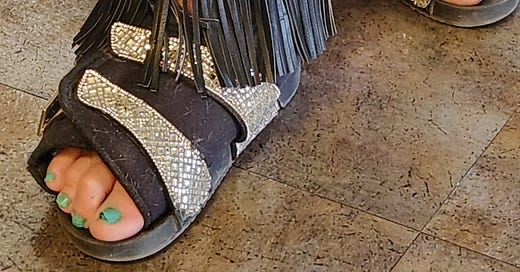This is not medical advice.
The first total knee replacement patient I saw in New Mexico, didn’t have much time for therapy. Stretching and measuring is very important so that the knee does not become frozen. This guy was a rancher on his horse, and got stuck between a fence post and some cattle. They cranked his knee all the way back for him, all at once. I imagine that was very painful, however he was proud of accomplishing the stretching all at once, instead of having to waste his time with us losers. “Done and done!”
Don't do this after total knee surgery...
This is not medical advice. Consult your doctor and therapist first before considering any suggestions in this article. Don’t ignore your range of motion progress. Back when I started as an assistant in ‘94, there was still a large emphasis on passive range of motion progress. As there should be.
I say “horse people” in the title to encompass my interactions with an entire group of ranchers, farmers, jockeys, breeders, trainers, barrel racers, ropers, etc.
I love the horse people and ranching type attitude. They are usually extremely friendly, tough and stubborn. Sometimes they are so tough, it is to their detriment.
That subtitle is something a patient said. She is also wearing this injury boot pictured above. It’s amazing how much horse people are able to put a positive spin on a difficult and painful situation. Making lemonade out of lemons.
There is this giant spectrum of outlooks in rehab, positivity or negativity, and we witness them all. From dire outlooks over an inability to play pickle ball, to eternal optimism from someone confined to a wheelchair.
I grew up in a small town near Boston, and we didn’t own livestock or live on a farm. So when I moved out West, this was all new culture to me.
I was very excited to be on a horse for the first time. I was at a summer camp in Colorado and we were due for an overnight campout. It was a 3 hour ride.
I was so saddle sore near the end, I was begging the horse to move slowly.
Horse rehab
The first question I get in rehab is, “when can I get back on the horse?”, or more frequently it’s not a question, but a statement, “I’m getting back on the horse.”
Sometimes getting back on after surgery too soon can cause problems, yet the overall toughness/stubbornness helps people stay stronger.
One of the local orthopedic surgeons will sometimes write “horse accident” on the script, as in motor vehicle. Hilarious, and quite common.
I have become increasingly skeptical of my own industry and profession over the years. So I get a healthy amount of questioning why.
The prevailing attitude is “no pain, no gain”, and if a little is ok, more must be better.
This isn’t always the case, and sometimes we can make things worse by not listening to our body.
But that tough attitude just keeps them going. And in many cases, to keep going may be better in the long run.
The other side of the spectrum that I see, is not doing enough, and that can snowball into worse situations also.
I get wanting to be back on the horse, and outside. As I (hopefully) near the end of a corporate career under florescent lighting, all I want to do these days is be outside.







So.. based on your last sentence, you are kinda like a horse person???. Or trying.?
Ever tried bareback?😁 Cool article!